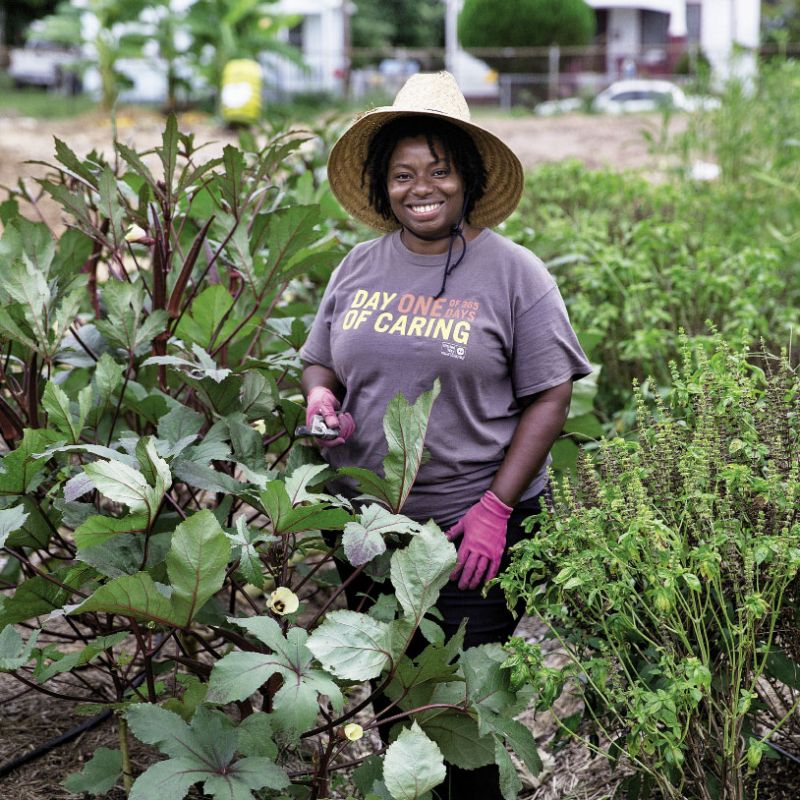
In North Charleston’s Chicora-Cherokee neighborhood—a certified food desert, as defined by the USDA—a mighty shift has taken place over recent years. What stood as a vacant lot in 2010 is now the four-year-old Chicora Place Community Garden: a lush quarter acre that yields anywhere from 200 to 300 pounds of fresh produce annually. And half a mile down the road at Fresh Future Farm—a nonprofit organic farm and store opened last month—stands a towering food forest: a self-sustaining community of edibles ranging from pecan and fig trees to blueberry bushes, veggies, herbs, and more. As manager of the former and CEO of the latter, North Charleston resident Germaine Jenkins has cultivated nutritional, community, and economic development within the once-blighted neighborhood and beyond.
In 2000, Jenkins, a Pee Dee native, moved to Charleston as a single mom to pursue a degree at Johnson & Wales University. To help fill her children’s bellies, she visited the Lowcountry Food Bank and soon began volunteering at its Kids Café, teaching families how to combine food-bank staples with fresh produce to create well-balanced meals. After working for the food bank for a few years, Jenkins became a board member with Metanoia, a holistic community development nonprofit in North Charleston through which she purchased a home in 2007.
“I started attending out-of-state conferences on how neighborhoods like ours could be revitalized and learned that many ways were connected with food,” says Jenkins. That realization—coupled with the firsthand experience of living in a food desert—sprouted an idea for a community garden, which broke ground in 2011, thanks to backing from Metanoia and a grant from Healthy North Charleston. Four years, 50-plus volunteers, and some 800 pounds of fruits and veggies later, Jenkins founded Fresh Future Farm in 2015.
“Being a food desert is a symptom of many issues,” explains Jenkins. “It’s usually in an employment desert, as well, and a traditional grocery store isn’t going to locate itself where people don’t have disposable income.” Selling organic produce, organic and conventional eggs and dairy, and locally sourced meats, the farm store—which accepts food stamps—will fill a huge void in the area, where residents have to travel long distances by bus, bike, or on foot just to buy fresh, unprocessed fare. “Our goal is to bring the food in order to keep dollars in the neighborhood, to create jobs, and to create disposable income, so people can stay and shop where they live,” she says.
Anyone who volunteers in the garden or farm leaves with fresh produce, as well as seeds, gardening tips, and a breakdown of the foods’ nutritional value. “For me, it’s free therapy,” says Mahwish “Mev” McIntosh, a former Park Circle resident who volunteers in the garden with her three-year-old each month and is a chairperson of Fresh Future Farm. “For my daughter, it’s a vast learning experience in science, service, and empathy.”
The community garden serves as a social hub for the 2,000-plus-person Chicora-Cherokee neighborhood, as well. Volunteer workdays are followed by potluck lunches, and every few months, a sheet is strung from the garden’s rain catchment to screen a movie. And in preparation for this month’s local elections, the garden hosted a voter registration and candidate meet-and-greet event in October. “Germaine understands how gardening can help empower folks to take charge of their personal health and well-being,” says McIntosh.
Even before it opened its doors, Fresh Future Farm proved a catalyst of community sharing: While waiting for its SNAP equipment to arrive, Fresh Future Farm donated hundreds of pounds of produce to residents and Destiny’s Community Café, a pay-what-you-can restaurant in the area. “I don’t think Germaine quite realizes the ripple effect she’s creating,” says McIntosh. “And now that the farm and store are up and running, the benefits for Chicora-Cherokee residents and surrounding communities will be extraordinary.”
By the numbers
Chicora-Cherokee won first place in the 2015 Clean City Sweeps Neighborhood competition, hosted by the nonprofit Keep North Charleston Beautiful.
Fresh Future Farm’s two-year goals include increasing its sale of produce by 20 percent; increasing the understanding of lifestyle changes that eliminate, reduce, and/or manage chronic food-related illnesses by 20 percent; and employing at least five neighborhood residents.
Thanks to a recent grant, the farm can cover the cost of more than 100 farm tours for area pre-kindergarten and school-age children over the next year.
As the farm’s operation grows, it will offer complimentary rides home to patrons who buy $50 worth of groceries.